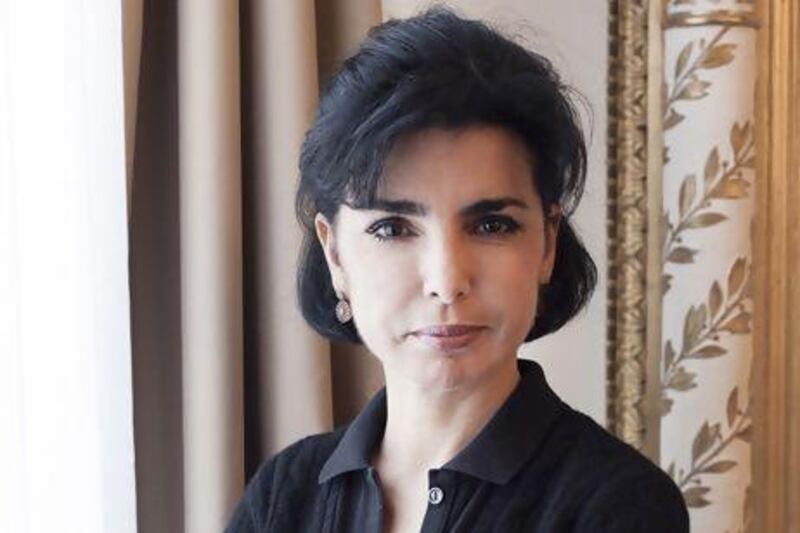PARIS // France's best-known Muslim woman has spoken of her fierce pride in a rise to political heights that her supporters believe could lead to a historic double: the country's first female president who is also an Arab.
Rachida Dati said in an interview that she does "not necessarily" have herself in mind when she uses the phrase "why not?" to assess her prospects of reaching the Elysee palace.
She insists she is talking instead about "people like me", those from poor immigrant backgrounds who have used education, talent and a burning desire to succeed to escape from ghettos, underachievement and poverty.
But she readily recognises, indeed proclaims, that this describes her own life.
"I bring together lots of firsts within the French political system and the big political parties," Ms Dati, 47, of Algerian and Moroccan origin, said. Her office is on Paris's elegant Left Bank, where she is mayor of the seventh arrondissement, or district.
"I am a woman and the product of a disadvantaged background, of Maghrebin origin, whose parents emigrated for economic reasons, to find a better life, and from a big family.
"That's not at all similar to the traditional pattern within the French political classes and big parties.
"And yet curiously, despite a good deal of resistance from certain sections of the political establishment, I have become very popular in a France that is changing."
Aides and political observers are in no doubt about the ambition of Ms Dati. She wants to be mayor of Paris, but the common consent is that she also would love to pursue her dream to the very top.
Already, Ms Dati's flight from the familiar blight of low-income housing estates, dominated by families with roots in France's former North and sub-Saharan African colonies, has involved her serving as a member of the national assembly, the former president Nicolas Sarkozy's justice minister and, now, the mayor of a smart Parisian district and a European parliamentarian.
She says she took enormous pride in her ministerial legacy of reforms of court procedures and the way magistrates dealt with accused persons, stressing that this was a sense of achievement she felt "for people like me".
There are formidable hurdles to clear in Ms Dati's struggle to win a primaries vote at the end of May. That would establish her as the centre-right Union for a Popular Movement (UMP) candidate for the capital's top municipal job.
Municipal elections in Paris are to be held next year, and the elected councillors will then choose a new mayor to replace Bernard Delanoe, the socialist who has run city hall since 2001 but is standing down.
All that seems probable is that Mr Delanoe will be replaced by a woman.
But in Ms Dati's way, in an electoral battle that is starting to capture international attention, stand two other high-profile female politicians. Nathalie Kosciusko-Morizet, another former minister from her own party, is the favourite to win the UMP nomination, while Anne Hidalgo, a socialist, is seen by Paris's powerful left as Mr Delanoe's natural successor.
Even if she finds Ms Kosciusko-Morizet impossible to beat, or wins the primaries but fails to defy the Left in the mayoral election, Ms Dati is unlikely to fade away.
Instead, observers believe, she would use her prominent public image to fight on in the hope of restoring conservative control of the Elysee when the socialist Francois Hollande's presidential mandate ends in 2017.
She has previously said she would be happy to be president if the country wanted her.
Despite the reluctance to repeat such statements and declare outright that she is talking about herself when she says there is no reason why someone like her should not take high office, the concept is one she appears to warm to.
She cheerfully adopts questions about the sort of leader she would be in charge of the capital or the country, "for all French people, not just the partisans who belong to my party".
And the precedent of historic advances elsewhere in the world fuel her enthusiasm. "I remember when Nicolas Sarkozy met Barack Obama back in 2003 or 2004. No one would have believed this man would quite soon succeed as president of the United States," she said.
Those close to Ms Dati, as well as the pundits, say she sees herself in similar mould-breaking terms.
In Paris, she sees an opportunity to break the socialists' 13-year stranglehold because, on her analysis, her origins give her a common touch. "I will continue to campaign, arrondissement by arrondissement, trying to reach all Parisians, including those who are not otherwise in agreement with me. They all have the same preoccupations: accommodation, transport, security and restoring cleanliness in a city that has become dirty."
If the odds turn out to be stacked too heavily against her, she hopes to go on serving the residents of the seventh arrondissement who, she says, "tell me to stay with them". It is also possible she would work at city hall with Ms Kosciusko-Morizet if the latter won; "we speak to each other and are not enemies", she says.
And in the event of Mr Hollande's government collapsing, despite its comfortable majority, in the face of failures and crisis, she would be seen as a strong contender for a return to ministerial office.







